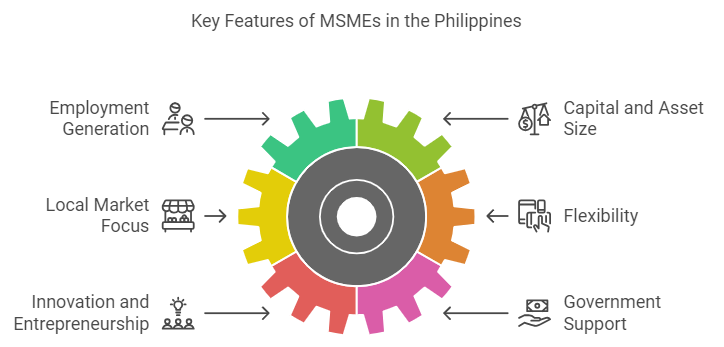Micro, Small, and Medium Enterprises (MSMEs) are the backbone of the Philippine economy, playing a pivotal role in economic development, job creation, and income generation. Comprising a significant majority of the country's businesses, around 99%, MSMEs drive innovation, encourage entrepreneurship, and contribute to regional and rural development.
Hence, understanding their role and importance is essential for appreciating how they shape the economic landscape, influence policy-making, and impact the lives of millions of Filipinos. This blog begins by demystifying MSMEs and why they are crucial.
Moreover, as you read this blog in more detail, you'll discover how these enterprises impact both rural and urban development while keeping up with technological advances to remain competitive in the market. So, without much ado, let us explore all the relevant details regarding MSMEs in the Philippines.

What is MSME in Entrepreneurship in The Philippines?

MSMEs (Micro, Small, and Medium Enterprises) in the Philippines are businesses categorized based on their asset size and number of employees. They form a vital part of the country's economy and represent a significant portion of the business sector.
These enterprises provide employment, foster innovation, and drive regional economic development across the country.
MSMEs in the Philippines are segregated into 3 categories -
- Micro Enterprises: Employ fewer than 10 workers with assets not exceeding PHP 3 million.
- Small Enterprises: Employ between 10 and 99 workers, with assets ranging from PHP 3 million to PHP 15 million.
- Medium Enterprises: Employ between 100 and 199 workers, with assets between PHP 15 million and PHP 100 million.
Also Read: Fast Business Loans for Quick Cash in 2024
Crucial Features of MSMEs in The Philippines
MSMEs offer significant contributions, and their unique characteristics enable them to thrive in diverse markets. Here, take a look at some of the critical features of MSMEs in the Philippines -

1. Employment Generation
MSMEs create a large portion of jobs, employing more than 60% of the workforce in the Philippines.
2. Capital and Asset Size
These businesses have limited capital, with assets ranging from under PHP 3 million for micro-enterprises to PHP 100 million for medium enterprises.
3. Local Market Focus
Most MSMEs cater to local markets, offering services and products tailored to local community needs.
4. Flexibility
MSMEs are agile and can quickly adapt to changes in market conditions or consumer preferences.
5. Innovation and Entrepreneurship
These enterprises encourage innovation, with many offering unique products or services driven by entrepreneurial creativity.
6. Government Support
The Philippine government provides various incentives, such as loans, tax benefits, and training, to support the growth of MSMEs.
Also Read: Quick Cash Loans without Collateral in the Philippines
Challenges Faced by MSMEs in The Philippines
Despite their vital role in the Philippine economy, MSMEs face significant challenges that hinder their growth and sustainability. Addressing these obstacles is crucial for them, as it enables a more supportive business environment.
Here are the significant challenges faced by MSMEs in the Philippines -
1. Limited Access to Financing
Many MSMEs struggle to secure loans due to a lack of collateral, insufficient credit history, or complex lending processes, which limits their ability to expand.
2. High Operational Costs
Rising utility, raw material, and wage costs place financial pressure on MSMEs, often reducing their profitability and growth potential.
3. Regulatory and Compliance Burden
Going through the complicated government regulations, taxes, and permits can overwhelm MSMEs, leading to operational delays and increased costs.
4. Lack of Business Knowledge
Many MSMEs lack formal training in areas such as financial management, marketing, and strategic planning, which limits their competitiveness and overall efficiency.
5. Competition from Large Enterprises
MSMEs face intense competition from bigger businesses with more resources, better pricing strategies, and more extensive market reach.
6. Limited Market Access
Due to inadequate marketing and distribution resources available to them, MSMEs often struggle to expand their customer base beyond their local area.
Also Read: Improving Efficiency in Finance Business Processes
Government Support and Policies in Place For MSMEs in Philippines
The Philippine government recognizes the critical role of MSMEs in economic development and has introduced various programs and policies to support their growth and sustainability.
Essentially, these initiatives aim to provide financial assistance, business development services, and an enabling environment for MSMEs.
Here, take a look at the essential support measures and policies taken up by the Philippine government for the progress of MSMEs in the country -
1. Magna Carta for MSMEs (RA 9501)
This law mandates banks allocate a portion of their loan portfolios to MSMEs, ensuring small businesses can access credit. It also provides incentives and other support mechanisms to boost MSME growth.
2. Pondo sa Pagbabago at Pag-Asenso (P3) Program
The P3 program offers low-interest loans to micro-entrepreneurs, helping them avoid high-interest informal lending and giving them affordable financing options for business expansion.
3. Barangay Micro Business Enterprises (BMBE) Act
The BMBE Act provides tax exemptions and other benefits to micro-enterprises, reducing the financial burden and helping small businesses thrive.
4. Shared Service Facilities (SSF) Program
This initiative by the Department of Trade and Industry (DTI) provides MSMEs with access to equipment, technology, and facilities to improve production efficiency and product quality.
5. Go Negosyo Act (RA 10644)
The Go Negosyo Act establishes Negosyo Centers nationwide, providing MSMEs with business advisory services, mentorship, and access to market linkages to support their growth and development.
6. Kapatid Mentor ME (KMME) Program
This DTI program offers mentorship and training to MSMEs, helping them develop business skills, financial management, and marketing strategies for better business performance.
Also Read: Exploring Instruments for Alternative Finance Providers
Don’t let cash flow slow you down. Apply for N90’s fast financing solutions and propel your Philippine SME forward! Get potential loan approvals within 24 hours to accelerate your business’s growth promptly. Contact us to learn more.
Importance of MSMEs in Rural and Urban Development

MSMEs play a pivotal role in both rural and urban development by stimulating economic activity, creating jobs, and enabling innovation. Their presence enhances the financial landscape by addressing local needs and promoting entrepreneurship.
Here’s how MSMEs contribute to rural and urban development in the Philippines -
1. Job Creation
MSMEs provide employment opportunities in both rural and urban areas, reducing unemployment and enabling families to achieve financial stability.
2. Regional Economic Growth
In rural areas, MSMEs stimulate local economies by generating income, encouraging entrepreneurship, and reducing reliance on agriculture as the sole source of livelihood.
3. Poverty Alleviation
MSMEs offer livelihood opportunities to marginalized groups, empowering them to lift themselves out of poverty and contributing to inclusive economic growth.
4. Urban Development and Innovation
In urban areas, MSMEs drive innovation by offering unique products and services, catering to niche markets, and boosting local economies through their dynamic presence.
5. Infrastructure and Services Improvement
The growth of MSMEs encourages the improvement of infrastructure and public services in both rural and urban areas as the demand for better transportation, communication, and utilities increases.
6. Encouraging Balanced Development
By encouraging and enabling entrepreneurship in rural areas, MSMEs reduce migration to urban centers, promoting balanced national development and easing the strain on urban resources.
Also Read: Understanding Working Capital Needs For A Small Business
Role of MSMEs in Technological Advancement and Market Development in The Philippines
MSMEs are crucial in driving technological innovation and market development in the Philippines by embracing technology and entering new markets. Here’s how they do it -
1. Adoption of Digital Tools
MSMEs increasingly adopt digital platforms for e-commerce, payment systems, and inventory management, modernizing their operations and improving efficiency.
2. Enabling Innovation
Many MSMEs experiment with new technologies and business models, bringing innovative products and services to the market, especially in IT, agriculture, and retail industries.
3. Expanding Market Reach
Online platforms help MSMEs reach broader markets, both locally and internationally, overcome geographic limitations, and scale their businesses.
4. Promoting E-Commerce Growth
MSMEs play a crucial role in expanding the e-commerce sector in the Philippines, contributing to the digital economy, and creating new consumer markets.
5. Driving Technological Adaptation
MSMEs’ need for efficiency has pushed the development and adoption of affordable technological solutions like mobile payment systems, fintech platforms, and cloud-based services, fostering a more tech-savvy business environment.
6. Boosting Competitive Markets
By introducing innovative products and services, MSMEs create competition in both traditional and emerging markets, promoting quality improvements and price competitiveness.
Do you need more clarity on the importance of MSMEs to the Philippine economy? Check out this video. Here, the DTI clearly explains the role and importance of MSMEs to the Philippine economy, as well as the steps taken to help them grow.
Also Read: Finance in Business: Basics, Role, and Importance
The Future of MSMEs in The Philippines
The future of MSMEs in the Philippines is full of potential. Technological advancements, increased government support, and evolving consumer preferences drive growth opportunities.
As key drivers of economic development, MSMEs are poised to play an even more significant role in shaping the country’s economy. Here’s what the future holds for MSMEs in the Philippines -
1. Increased Digitalization
With the rise of e-commerce and digital platforms, more MSMEs are expected to embrace technology, improving their efficiency and expanding their market reach both locally and globally.
2. Government Support and Policy Reforms
The Philippine government will likely continue strengthening support programs, including financing, training, and market access initiatives, to help MSMEs scale and compete in a dynamic business environment.
3. Sustainable and Green Business Practices
As consumers become more environmentally conscious, MSMEs adopting sustainable and eco-friendly practices will have a competitive edge, opening new market opportunities in the green economy.
4. Access to Global Markets
Technology and trade agreements will help MSMEs increase their opportunities to enter international markets, allowing them to grow their businesses beyond local boundaries.
5. Enhanced Access to Financing
Fintech innovations and government programs will likely improve access to funding for MSMEs, enabling more small businesses to secure the capital needed for expansion.
6. Strengthened Entrepreneurial Ecosystem
As more entrepreneurial education and mentorship programs emerge, MSMEs will benefit from enhanced business knowledge, strategic planning, and innovation, leading to more sustainable growth.
Conclusion
In conclusion, as this article clearly highlights, MSMEs are the backbone of the Philippine economy. They are characterized by their ability to create jobs, encourage and enable innovation, and contribute to regional development.
Their key features, such as agility, low capital requirements, and localized market focus, enable them to cater to diverse consumer needs while driving economic inclusivity. These enterprises account for a significant share of employment and GDP, highlighting their vital role in shaping the country’s financial landscape.
As the Philippines moves toward a more digital and globally connected economy, the role of MSMEs will only grow in importance. With the adoption of new technologies, increased government support, and a focus on sustainable practices, MSMEs are well-positioned to lead economic growth in the future.
Their capacity to adapt, innovate, and expand into new markets will ensure their continued contribution to national development and their ability to uplift communities nationwide. Hence, it is fair to say that MSMEs are crucial elements of the Philippine economy today and for the foreseeable future as well.
Frequently Asked Questions (FAQs)
1. What is the role of MSME in the Philippine economy?
MSMEs play a crucial role in the Philippine economy by creating jobs, contributing around 35-40% to the GDP, and fostering innovation.
They drive local and regional development, reduce poverty by providing livelihoods, and promote inclusive growth by empowering small entrepreneurs across various sectors, especially in rural areas.
2. What is the importance of digital marketing for MSMEs in the Philippines?
Digital marketing is vital for MSMEs in the Philippines as it enables them to reach a wider audience at a lower cost, increase brand visibility, and compete with larger businesses.
Through social media, e-commerce, and online advertising, MSMEs can effectively promote their products, engage with customers, and drive sales, helping them grow in a competitive digital marketplace.
3. How many MSMEs are there in the Philippines as of 2023?
As of 2023, approximately 1.08 million MSMEs operate in the Philippines, accounting for 99.58% of the country's total business establishments.
As per the Philippines Department of Trade and Industry, these enterprises employ about 63% of the workforce, showcasing their significant role in job creation and economic development.
4. Why is the Magna Carta important for MSME in the Philippines?
The Magna Carta for MSMEs (RA 9501) is crucial for MSMEs in the Philippines because it provides a comprehensive policy framework to support their growth and development.
It mandates financial institutions allocate 10% of their loan portfolios to MSMEs, offers tax incentives, and promotes entrepreneurship. Thus, this law fosters an enabling environment for MSMEs to thrive.













